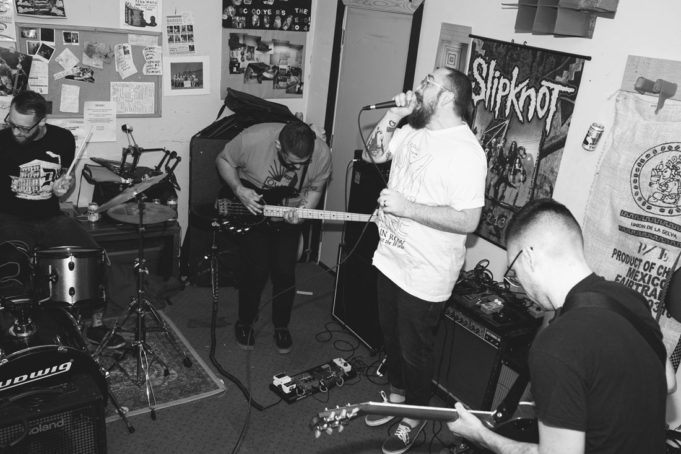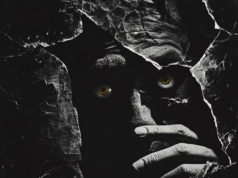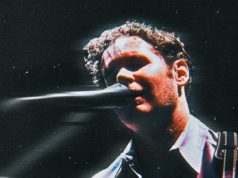One might think it would be difficult for dads in their 30s to tap into the push/pull of angst and hope that fuels punk rockers during their formative years. Time and distance are often the soft, downy filling which cushions the warm-blanket comforts of domesticity and responsibility. For some, these layers become too thick to penetrate. This insulation blocks out the youthful naivete and passion on which young punx once sustained and ultimately gives way to security and domiciliary concerns. Not so with guitarist Rene Floyd and vocalist Jordan Kline, the kindred duo that serves as the braintrust behind Unspell.
What began as a friendship between two EDM DJs struck from a mutual affection for early 2000s post-hardcore and emo has now culminated in Believe in What You Want. Unspell’s debut EP, which appeared on Bandcamp on March 20, is a series of thoughtful and inspirational ruminations set to artfully aggressive and powerfully sentimental turn-of-the-century emo nostalgia. Unpsell is what happens when the lightning of callow hardcore rage is captured in the smooth and well-polished bottle of age and maturity, shaken and swirled around, and then let loose on the world again.
“We’re not like those younger band guys,” Floyd acknowledged in a phone interview. “We’re self-aware. We realize we’re middle-aged guys with kids and lives. Some of that stuff is maybe not as ‘cool’ to younger audiences. All we can do is be ourselves, and maybe people around our age will embrace us for talking about things that affect our age group, things like politics or mental health, taking care of yourself, or being in a stable relationship.”
Though the band has been playing together less than a year, the seeds of Unspell go back more than three. Floyd and Kline met while working together at Avoca Coffee on West Magnolia Avenue in 2017. As they were both DJs, they hit it off, recognizing and appreciating each other’s wide and varied musical tastes that they would share with each other by listening to different playlists they created as they closed the shop. In addition, they found they also shared similar upbringings, having both been raised in what Floyd describes as “super-authoritative Christian backgrounds.” As teens, they found escape from the socially and culturally oppressive environments in which they grew up through emo-core bands like Further Seems Forever and Pg. 99. It wasn’t long before they started talking about making music together.
Initially, though the music Floyd had always written on guitar was loud, fast, and punk-flavored, the idea for a new band was centered on a vibey marriage of rock and electronic music a la The XX. At an initial jam session, Floyd was showing Kline some of the material he’d been working on, ensuring Kline he would alter the punkier riffs to fit the sound they both had in mind. But as he was playing, Kline sat behind a drum kit and began playing along. He also grabbed a microphone and began singing. The sound that they immediately landed on was anything but atmospheric and ethereal. It was aggressive and powerful, much more akin to the music they loved in their younger rebellious days than the music they were listening to currently.
“When he started singing, I was like, ‘Wait, this changes everything,’ ” Floyd recalled of their first rehearsal. “I never knew he could sing like that. I was like, ‘Why are we trying so hard fighting this? Why are we trying to force this electronic element type to stuff work?’ The band switched all at once.”
They would ultimately add a drummer, Brian Bailey (Bliss), whom they also knew from Avoca, freeing up Kline to just sing. They also recruited a guitarist in Kenny Collins, with Floyd shifting over to bass. In a few months, they had worked out eight of the songs Floyd had written for the project. In October of last year, they went into Dallas’ Elmwood Studios with engineer Alex Bhore (All Clean, BULLS) at the helm of the sessions. Danny Kalb (Son of Stan, Oil Boom) mastered.
Believe in What You Want opens with a sample. Footsteps crunch in gravel before a voice asks, “Hey, are you a dreamer? I don’t see too many around lately.” And this sets the tone for the Unspell’s complex philosophy that they unfurl over the EP’s five songs.
“The concept of Unspell is basically to deconstruct things like language and math,” Floyd explained. “These things we take for granted. Actually thinking about the etymology of words when you use them. As a means to a more pure [form of communication] and a path to being more considerate and a person of integrity. [Refuting] ill-gotten knowledge, by ill-gotten means.”












